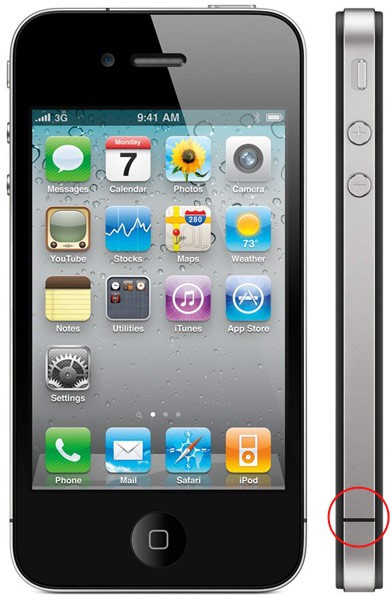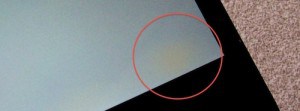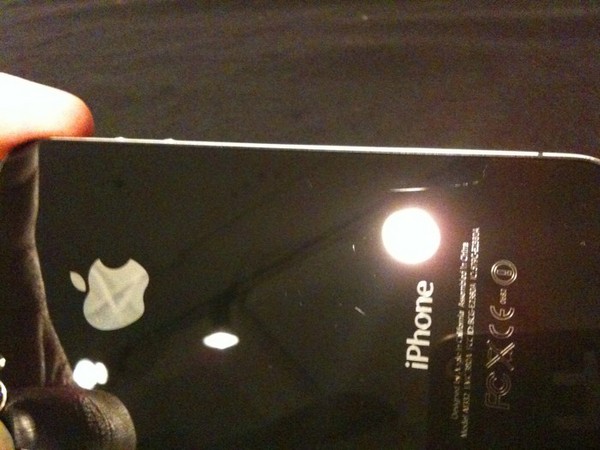
Don't touch this -- Bridging the gap (circled) can drive your iPhone's signal bars into a ditch
The long lines are over. The hype that drove some Apple fanboys to wait hours in line, even with an advance reservation for the phone, has died down. The people in the office you irritated bragging about your conquest have moved on with their lives. For a growing number of early iPhone 4 buyers, that exhilaration is now being replaced with a realization: you are a beta tester for a new product that has some nagging design problems and defects. And you are still stuck with AT&T, the nation’s least favorite wireless carrier. Only now, it’s not just AT&T dropping your calls — it’s the iPhone itself.
A growing number of buyers have discovered a flaw so obvious even the most rudimentary testing, even from the drunk guy who left his phone in that California bar, should have picked up — if you hold the phone in your hand a certain way to make a call, the iPhone has a tendency to drop it. That problem has grown so significant, Apple had to lock the message thread discussing the matter because it was crashing the browsers of support forum visitors.
You didn’t buy the iPhone to actually make calls, did you?
Sorting out whether the dropped calls are Apple’s fault or just business as usual at AT&T is now underway.
Apple’s answer to this particular problem is to turn the potential marketing crisis into an opportunity — by selling you a $30 “bumper”-case to keep your hands from actually touching the phone’s side, which is part of the antenna system. The case’s odd design, which only covers the sides of the phone, has some speculating Apple knew about this problem all along and designed a case to mitigate the problem, and pocket the proceeds.
A leaked memo from Apple includes talking points to calm customers who have concerns Apple thinks are non-issues. Apple even insists its representatives take a moment to summon up the proper “tone” when dealing with customers:
1. Keep all of the positioning statements in the BN handy – your tone when delivering this information is important.
- The iPhone 4’s wireless performance is the best we have ever shipped. Our testing shows that iPhone 4’s overall antenna performance is better than iPhone 3GS.
- Gripping almost any mobile phone in certain places will reduce its reception. This is true of the iPhone 4, the iPhone 3GS, and many other phones we have tested. It is a fact of life in the wireless world.
- If you are experiencing this on your iPhone 3GS, avoid covering the bottom-right side with your hand.
- If you are experiencing this on your iPhone 4, avoid covering the black strip in the lower-left corner of the metal band.
- The use of a case or Bumper that is made out of rubber or plastic may improve wireless performance by keeping your hand from directly covering these areas.
2. Do not perform warranty service. Use the positioning above for any customer questions or concerns.
3. Don’t forget YOU STILL NEED to probe and troubleshoot. If a customer calls about their reception while the phone is sitting on a table (not being held) it is not the metal band.
4. ONLY escalate if the issue exists when the phone is not held AND you cannot resolve it.
5. We ARE NOT appeasing customers with free bumpers – DON’T promise a free bumper to customers.

The yellow blotch problem
This week, even more problems are showing up:
- The Glitchy Proximity Sensor: PC World covers the iPhone’s sudden activation of the menu screen while talking on the phone. With one’s face next to the screen, customers are reporting calls suddenly switched to speakerphone mode, muted, or throwing blasts of touchtones at callers.
- AT&T “Still Sucks”: Customers in San Francisco and Los Angeles, among other large cities, report “Bermuda Triangle” reception zones where calls regularly drop and cannot be made. Randomly dropped calls are also still a major problem, and some customers believe the latest iPhone is more prone to showing “no service” than earlier models.
- Yellow Screen Blotches: Yellow-tinted blotches are visible on several owners’ iPhone screens. Apple claims this is residue from the manufacturing process to bind the glass to the screen and will disappear with use as the adhesive fully dries. Gizmodo reports these phones were likely rushed through manufacturing and shipped in time for the iPhone release day. While some customers confirm the blotches do seem to be fading, others have been instructed by Apple to return yellow-tinged phones for replacement.
- Easily-Scratchable: Despite the hype about breakthrough glass technology making the phone more scratch resistant than ever, folks on Engadget found it was quite easy to tear up the phone when placed in a pocket with keys or other scratchy things.

Engadget received photos of scratched iPods hours after being unboxed (click to enlarge)
A Sacramento law firm, Kershaw, Cutter & Ratinoff has already started looking for customers experiencing poor reception quality and dropped calls, presumably to consider a class action lawsuit against Apple, AT&T, or both. As of now, the law firm has received more than 400 complaints.
The signal loss problem has the prospect of becoming the most notorious — for both Apple and AT&T — especially when it is easily reproduced by reporters on the local evening news (see below). But Steve Jobs thinks the complaints are overblown, writing back to one complainer, “Non issue. Just avoid holding it in that way.”
Despite that, Gizmodo launched a petition urging Apple to give free cases to all iPhone 4 owners.
Every product launch has its bugs. We’ve seen a lot this time. Many issues, like the yellow screens, will go away as manufacturing fine tunes and adjusts to solve the problems. But the antenna issue is a fundamental one, a design flaw, that won’t go away as easily without adjusting the product in a deeper way.
So with all these great things, it’s terrible that buyers should have this excellent phone ruined for them because of a single, but serious, design problem. And even worse that Apple should suggest users use their phones in unnatural ways or shell out $30—for what is essentially a double wide livestrong armband—to fix it.
According to some Apple-watchers, the company plans a software fix, suggesting the signal meter displayed on the phone is the real issue, not the actual quality of reception from AT&T. If the software fix only re-calibrates the signal meter and consumers still see dropped calls and reception problems, additional complaints are likely.
After a week of made-for-TV-lines outside of Apple stores across the country, reality has set in and several stations are now turning their attention to the iPhone 4’s pesky problems.
We have a number of videos for you to watch below the jump!
… Continue Reading
 Verizon Wireless customers who subscribed to the company’s legacy America’s Choice wireless plans are receiving notification of a pending class action settlement between Verizon Wireless and two law firms that will bring a handful of free calling minutes to impacted customers while netting up to $6 million for the attorneys bringing the suit.
Verizon Wireless customers who subscribed to the company’s legacy America’s Choice wireless plans are receiving notification of a pending class action settlement between Verizon Wireless and two law firms that will bring a handful of free calling minutes to impacted customers while netting up to $6 million for the attorneys bringing the suit.

 Subscribe
Subscribe






